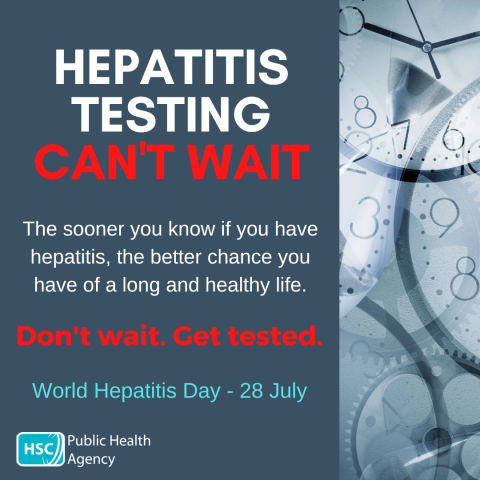World Hepatitis Day 2022 – ‘I can’t wait!’

With a person dying every 30 seconds from a hepatitis-related illness, this year’s theme for World Hepatitis Day is ‘I can’t wait’.
In Northern Ireland the Public Health Agency (PHA) has been working with health and social care trusts to achieve the World Health Organization goal of eliminating hepatitis B and C by 2030. This year’s theme will focus on making people aware of the risks of contracting the viruses and encouraging anyone who thinks they may be at risk of having contracted hepatitis to get tested and seek treatment.
Prof Diarmuid O'Donovan, Honorary Consultant in Health Protection at the PHA, said: “Hepatitis B and C can be serious, potentially life-threatening infections.
“There are many people out there who have hepatitis and simply don’t realise it, as hepatitis B and C are diseases that you can have for many years without developing any symptoms.
“However, they may be passed on to other people during this time and can lead to liver damage and liver cancer.
“The good news is that if diagnosed, they can be treated and, in the case of hepatitis C cured.
“There are many ways of picking up viral hepatitis, including it passing from mother to baby; coming in to contact with infected blood, for example through injecting substance use, or using unsterilised tattoo or piercing equipment; and sexual contact.
“The PHA is encouraging anyone who thinks they might have been at risk from contracting hepatitis to get tested and get treated. All the test involves is a simple finger prick or routine blood sample, and it could save your life.
“This test can be requested from your GP, local sexual health clinic or drug and alcohol service.”
In Northern Ireland, a total of 73 new hepatitis B infections and 124 new hepatitis C infections were reported in 2020.
New hepatitis C treatments have been game changing. A tablet a day over a matter of weeks cures the infection in over 95% of people, with minimal side effects.
This is in stark contrast with older treatments which were not as effective and had a lot of side effects.
Hepatitis C treatments are provided by a dedicated team who provide outreach clinics across Northern Ireland.
Prof O'Donovan continued: “While there is still a long way to go to meet the WHO goals of eliminating viral hepatitis as a public health threat by 2030, by health and social care services working together effectively we are making real progress which we will build on in the coming years.
“If we continue to work together we can raise awareness of these diseases, prevent new infections, and find those who are already diagnosed but unaware and engage them successfully in treatment.
“Ultimately we need people who may be at risk of having contracted hepatitis B or C to be tested and get treated if diagnosed.”
Short-term (acute) hepatitis often has no noticeable symptoms. You may not realise you have it.
If symptoms develop, they can include:
- muscle and joint pain
- a high temperature (fever) of 38C (100.4F) or above
- feeling and being sick
- feeling unusually tired all the time
- a general sense of feeling unwell
- loss of appetite
- abdominal (tummy) pain
- dark urine
- pale, grey-coloured poo
- itchy skin
- yellowing of the eyes and skin (jaundice)
See your GP if you have any persistent or troublesome symptoms that you think could be caused by hepatitis.
Long-term (chronic) hepatitis also may not have any obvious symptoms until the liver stops working properly (liver failure) and may only be picked up during blood tests.
In the later stages it can cause:
- jaundice
- swelling in the legs, ankles and feet
- confusion
- blood in your stools or vomit
The Northern Ireland Regional Hepatitis B&C Managed Clinical Network Annual Report 2020 can be found at www.publichealth.hscni.net/publications/ni-regional-hepatitis-bc-managed-clinical-network-annual-report
If you need to contact the hepatitis B and C network directly, you can do so by calling (028) 9155725 or visit www.hepbandcni.net
